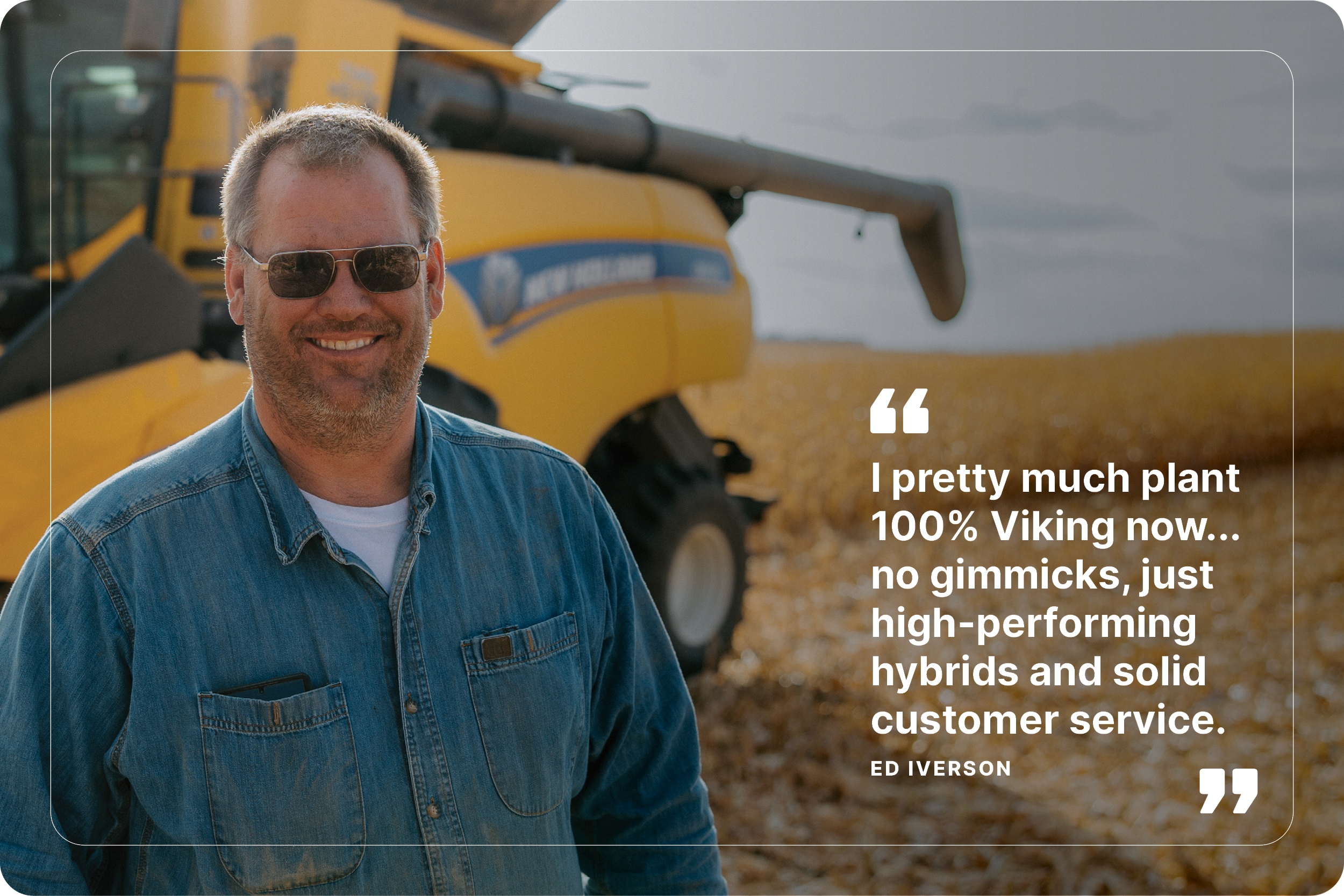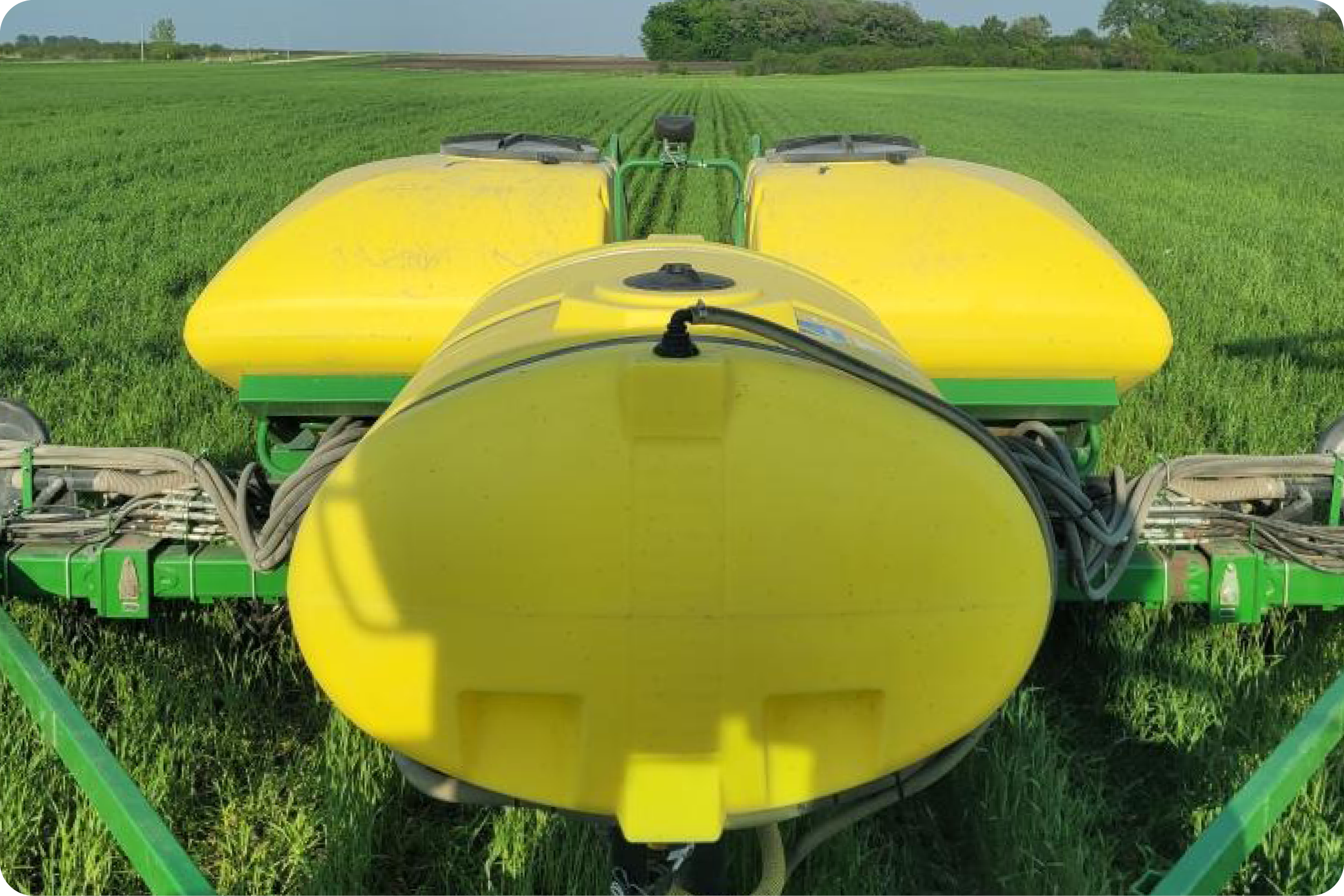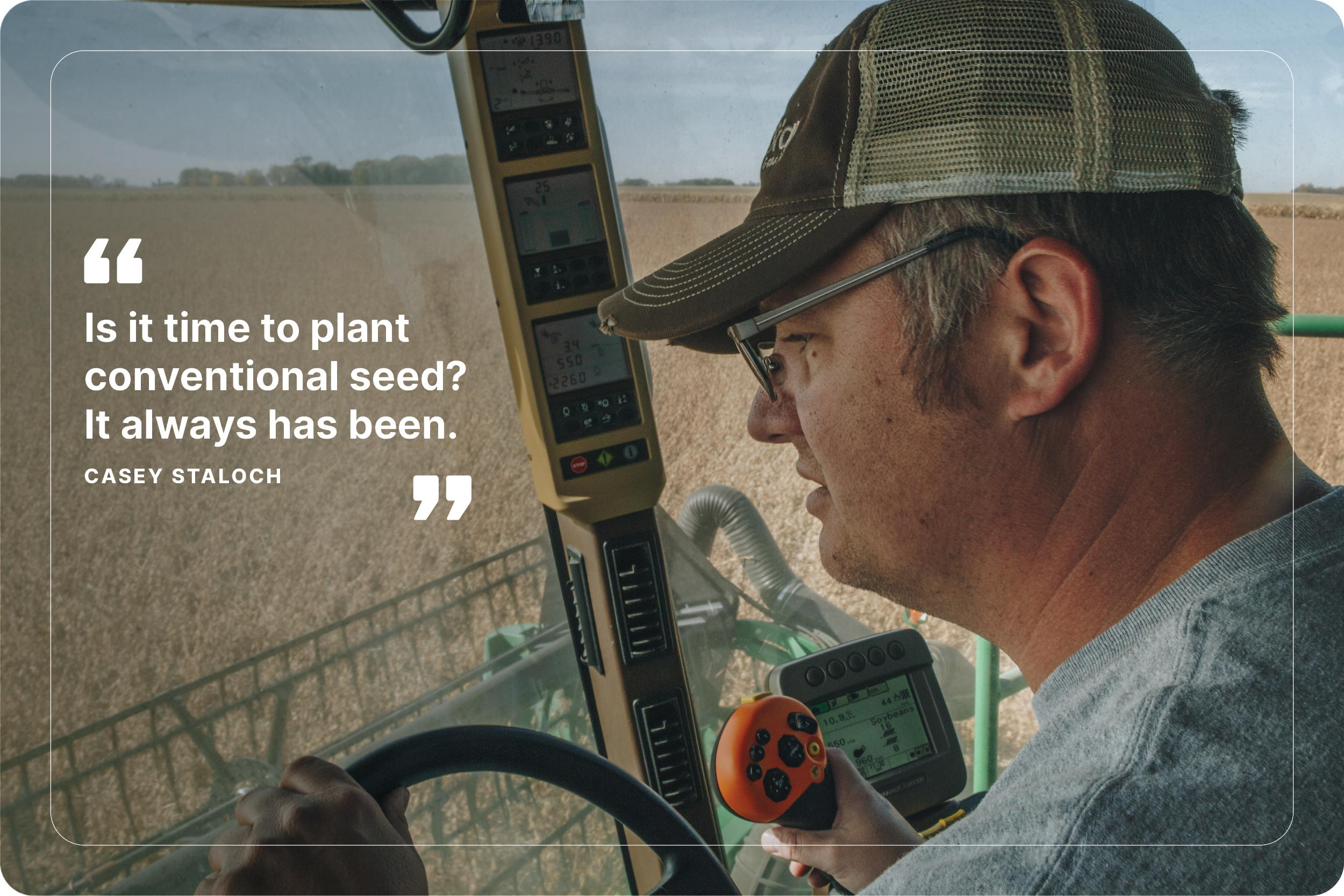Cole Thompson, Staff Writer
Casey Staloch, Farmer and Viking Dealer
Is growing conventional corn or soybeans right for you? Every year we talk to farmers who are considering trading in their high-priced traited corn or soybean seed for lower priced conventional options. A few questions always come up, so we thought we’d outline those and provide some data-backed answers to help you save money on seed without sacrificing performance. We also tapped long-time conventional farmer and Viking seed dealer Casey Staloch to share his in-depth knowledge on the subject. Watch the video below or read on to learn how you can maximize your return on every acre with Viking non-GMO corn and soybeans.
Can I get dependable yields without traits?
Viking conventional, non-GMO corn and soybeans had an outstanding year in 2024 FIRST & University trials—and on farms—throughout the nation, reaching 90+ top ten corn finishes and 90+ top ten soybean finishes (see below). We know that performance on farm is where it really matters. Here’s what Casey says on that topic: “Wanna save $80/acre without giving up yield? You’ve come to the right place. Why traits have been added can largely be disputed, but we can absolutely and confidently say that Viking conventional corn hybrids and soybean varieties consistently yield at the same and often above traited competitors. Not only are we competing with the best products available, we’re often beating big-name brands with expensive traits.”
If you’re still wondering if conventional, non-GMO corn and soybeans can yield, it’s time to check the data. In 2024, Viking corn and soybeans netted over 90 top-tens in trials across the country. Data for 2025 is still coming in, but it looks like they’ll be doing it again.
| HYBRID | RANK | YIELD | % MOISTURE | TRIAL | LOCATION |
|---|---|---|---|---|---|
| Viking/Blue River 76-11 | 1 | 246.7 | 16.6 | ISU South District Early | Milo, IA |
| Viking/Blue River 75-07 | 1 | 283.1 | 17.5 | FIRST IANC | Greene, IA |
| Viking 72-06 | 1 | 263.8 | 17.7 | FIRST MNSE | Nerstrand, MN |
| Viking/Blue River 76-11 | 1 | 225.5 | 14.5 | ISU Central District Full | Ames, IA |
| Viking/Blue River 76-11 | 1 | 203.3 | 13.4 | ISU South District Early | Crawfordsville, IA |
| Viking 72-06 | 1 | 231.0 | 12.4 | FIRST MNSW | Mankato, MN |
| Viking/Blue River 76-11 | 1 | 255.0 | 15.4 | ISU Central District Full | Summary |
| Blue River 24-82 | 1 | 234.5 | 15.2 | NDSU Corn Trials | Grand Forks, ND |
| Viking/Blue River 73-97 | 1 | 152.0 | 17.8 | U of M Central Zone | Rosemount, MN |
| Viking/Blue River 75-07 | 1 | 315.0 | UW Southern Zone | Arlington, WI | |
| Viking/Blue River 76-11 | 1 | 275.0 | UW Southern Zone | Janesville, WI | |
| Blue River 24-01 | 1 | 176.0 | UW South Central Zone | Hancock, WI | |
| Viking/Blue River 73-97 | 1 | 228.0 | UW North Central Zone | Valders, WI | |
| Viking/Blue River 75-07 | 1 | 300.0 | 20.9 | OSU Northeast Early | Columbiana, OH |
| VARIETY/BRAND | RANK | YIELD | TRIAL | LOCATION |
|---|---|---|---|---|
| Viking 1223N | 1 | 72.9 | FIRST MNCECV | Glencoe, MN |
| Blue River 30B4 | 1 | 79.5 | ISU Central District Full | Glidden, IA |
| Blue River 30B4 | 1 | 51.0 | OSU Soybean Test Early | Risingsun, OH |
| Blue River 27B4 | 1 | 76.5 | ISU Central District Early | Summary |
| Blue River 30B4 | 1 | 71.4 | OSU Soybean Test Early | Celina, OH |
| Viking 1223N | 1 | 65.1 | SDSU Trials Early | Brookings, SD |
| Viking 2022N | 1 | 62.0 | SDSU Trials Full | Brookings, SD |
| Blue River 27B4 | 1 | 88.0 | UW South Conv. | Platteville, WI |
| Viking/Blue River 0821N | 1 | 49.0 | UMN North General | Summary |
| Viking/Blue River 0821N | 1 | 65.5 | UMN North General | Crookston, MN |
| Viking 15B5 | 1 | 46.9 | UMN Central General | Summary |
| Viking 15B5 | 1 | 52.0 | UMN Central General | Becker, MN |
| Viking 15B5 | 1 | 51.4 | UMN Central General | Rosemount, MN |
| Viking/Blue River 2418N | 1 | 48.6 | UMN South General | Lamberton, MN |
If independent trials aren’t enough to pique your interest, there’s also testimony from long-time customers, like Ed and his dad Kern Iverson who’ve planted Viking conventional corn for more than 30 years. Ed says, “My dad started planting Viking corn in 1993. We’ve tried other corn many times, but I pretty much plant 100% Viking now. They have never steered me wrong, and they have always treated us fairly. There are no gimmicks, just high-performing hybrids and solid customer service.”

Another farmer in North Dakota says, “I just can’t believe guys would pay over $300 for Smartstax corn that ends up falling over anyway. All my neighbors had traited corn last year and it all looked horrible during the drought. I was pleased with this 86-day stuff; 190 bu is incredibly respectable in my area and we even pushed 200 sometimes. I’ll stick with my conventional corn.”
We encourage you to check your local FIRST or University trials and see where Viking finished over the last couple of years. You can view a selection of these trials on our trial data page.
How do I control weeds in Non-GMO Corn & Soybeans?
Everybody wants to know how hard it is to adjust your chemical program when you go conventional. When it comes to chemicals, non-GMO corn is not much different than traited corn (you just have to skip the glyphosate). Non-GMO soybeans must be managed differently. Here’s a simple breakdown from Casey who also suggests your local Co-op or crop protection expert is a good place to start:
“For corn, essentially you just can’t spray RoundUp or Liberty. Your pre-emergence program will be just like a normal program. Post-emergence, you can use Impact, Laudis, Callisto, or Accuron – just can’t use Roundup or Liberty. Your fungicide program can be exactly the same, and you can throw in an insecticide for insects you may want to target.
Of course it’s always best to consult your local crop protection expert. Ask them about conventional corn and they’ll be able to help you with a plan that avoids the usual suspects.”
“For soybeans it’s a little bit different and requires some management, but the non-GMO premiums make all of that worthwhile. Pre-emergence: same as usual. Post: First Rate, Flexstar, or Warrant Ultra. What I do is I plant my soybeans into rye. After I plant into rye, I do a burn down. This saves me a tillage pass in the spring. I do add an insecticide application just like most of you would. Again, I suggest talking to your crop protection expert. This works really well for me and a lot of my customers.”

As for managing Rootworm and Corn Borer without traits, Casey says:
“Most rootworm traits are no longer effective anyhow. Rootworm is best managed with crop rotation. If you’re going corn on corn, you must use insecticide.”
Can I really be more profitable with conventional seed?
One of our newer customers told us, “I need to find a more profitable way to grow corn.” If you’re in this camp, we have music for your ears. Let’s hear from Casey on the subject of profitability:
“This is my favorite part. I love to get my calculator out and do the math. At current prices, your top-traited bag of seed would have to yield an additional 18+ bu/acre to break even compared to Viking conventional, non-GMO corn. Now when I can get the same yield for $60-$100 less in seed cost per acre, that’s where the math becomes fun.
Let’s use some round numbers to make it easer, comparing a Viking conventional hybrid that cost you $155 a bag (with Early Pay Discount) and a top traited bag that costs you $325 (with early discount).
| Viking 104-Day | Top Traited 104-Day | |
|---|---|---|
| Seed Cost | $155 / Bag | $325 / Bag |
| Seed Cost / Acre (2.2 Acres / Bag) | $68.89 | $144.44 |
| Expected Yield / Acre | 230 Bu / Acre | 230 Bu / Acre |
| Expected Price / Acre | $4 / Bu | $4 / Bu |
| Revenue / Acre | $920 | $920 |
| Revenue Minus Seed Cost | $851.11 | $775.56 |
Imagine having $75.55 bu/acre more to work with for the rest of your expenses. That’s the wiggle room conventional corn can give you. A little more cushion on every acre to maximize profitability on your farm. You might be saying that your traited seed could still have a yield advantage and that’s worth the extra investment per acre. Using the same math from our example, your traited favorite would have to out-yield the conventional hybrid by 18.89 bu/acre (based on the $75.55 per acre difference and $4/bu corn price).”
Can I get premiums for non-GMO corn and soybeans?
The short answer is yes. The long answer is, it depends on a lot of factors, but generally there are premium marketing opportunities for both non-GMO corn and non-GMO soybeans. Here’s what Casey says:
“I recommend exploring established and emerging markets for corn and soybeans. Soybean premiums are easier to find than those for corn. If food-grade or other non-GMO markets aren’t available to you, you may need to lean on commodity prices to gauge your profitability. With soybeans, there are more opportunities readily available. Cargill, for instance, has a strong track record of working with growers on non-GMO contracts.”
Here’s an example of Cargill’s soybean program. They’re starting to contract with growers for their 2025-26 non-GMO soybean program:
- Delivery Point: Cargill Cedar Rapids-West
- Specs: 99.5% non-GMO purity, Any hilum color
- Premiums: Range from 2.40-2.60, depending on month
- Early signup bonus: Any bushels signed up by November 1 will get an additional 10 cts/bus over the stated premiums.
- Contact:
Andrea Flowers-Guckes
402.951.4638
andrea_flowers@cargill.com
It’s a good idea for you to explore marketing opportunities for your non-GMO grain. Here are some of the key buyers (we do not endorse or receive compensation from any of these buyers, and this is not at all a full list; we’re providing as example of resources you can explore):
- Cargill
Contact: Your Cargill Representative
Locations:
Cedar Rapids, IA, Bloomington, IL, Solae Gibson City, IL
- Stonebridge
Contact: 319.277.4277
Location: Cedar Falls, IA
- GrainMillers
Contact: 952.829.8821
Location: Eden Prairie, MN
- Consolidated Grain and Barge Co
Contact: 985.867.3500
Location: Multiple
- Nutritional Services
Contact: 641.832.1651
Location: Riceville, IA
- International Feed
Contact: 952.249.9818
Location: Minnesota
How do I get started?
We encourage you to try some on your farm and compare the results to some of your favorite traited products.Jake Hansen, Corn and Soybean Product Manager at Albert Lea Seed, works with conventional farmers and recently heard some good news from a newer customer who did this in Northwood, Iowa: “We just started corn harvest on Saturday. Very pleased with yields so far. Our first 68-acre field we did was 72-06. It was the best dry yield average we have ever had at 277 bu. The 2nd field we did was also 72-06. This 136-acre field made 264 bu. We also had a weigh wagon come out to compare 84-04 to a competitor’s 104-day conventional. 84-04 check was 295.7 bu. Competitor’s 104 was 280.”
If you’d like to learn more about trying some Viking conventional, non-GMO corn or soybeans in your rotation next spring, we’d love to talk more. There are also good conventional options provided by other brands. Whether you choose to work with us or not, we hope that you find it a little easier to come out with stronger math next fall with the help of conventional corn and soybean seed. Just make sure to try more than you think you’ll need as Carson Reese over in Kokomo, IN found out: “Just harvested some of my corn, and I am sure going to want some of that 75-07 in my field next year! I only had a test plot bag, but end-to-end on that bag, according to the monitor, was 293. Field average was 222.”
FIND A DEALER EXPLORE LINEUP